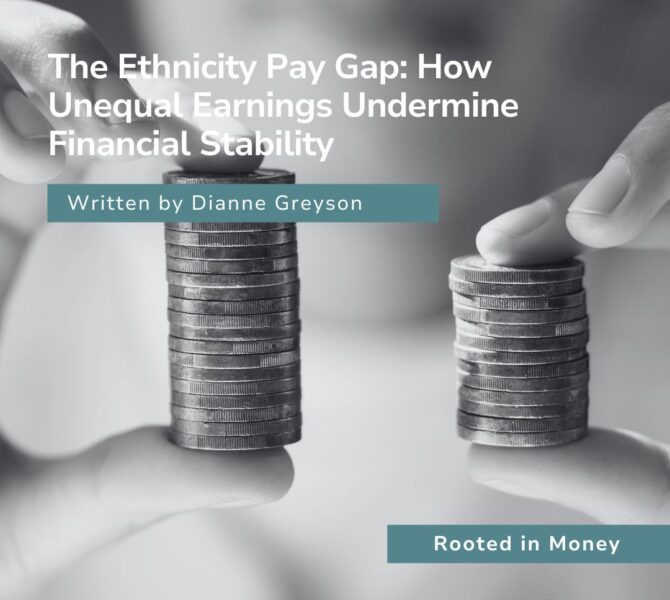When asked to contribute to this blog series it reminded me of a discussion with my mother about pay. She reflected on times where she was paid less than her white colleagues which was a normal thing in the 60s and 70s. Black people in particular were looked at as inferior so did not deserve the same rate of pay as white people. Forward to today, we still have pay disparity.
In 2018 it was reported that there was an Ethnicity Pay Gap of £3.2 billion in the UK.
This figure is likely to have increased due to the inaction of many. There is also evidence identifying an Ethnicity Pension Gap of 26% and an Ethnicity Motherhood Pay Penalty which suggests, over the medium to long term income the mean motherhood pay penalty is around 45%.
The Ethnicity Pay Gap is one of many pillars that create the Ethnicity Wealth Gap.
We are challenged by the structural behaviours that allow issues such as the Ethnicity Pay Gap to exist. Black workers are often cited as being over represented in low paid jobs. This may be the case but we are also visible in middle and senior management jobs and encounter Ethnicity Pay Gaps. In our research Impact on the Ethnicity Pay Gap on Black Women some of our participants sighted being in mid to senior level jobs and being overlooked for promotion and paid less than their white counterparts.
Systematic barriers like bias, discrimination and lack of transparency are clearly exposed by the Ethnicity Pay Gap in an organisation.
I have come across some organisations that have made real effort in challenging poor behaviours but we know that not enough organisations have done so. Up to 44% of companies (under half) have reporting on their Ethnicity Pay Gap. This does not tell us how many out of the 44% have taken any action to resolve this issue. Some have reported on figures that cannot be clearly scrutinised and although they may report a high Ethnicity Pay Gap there are no repercussions.
The government has recently consulted on the Ethnicity Pay Gap and Disability Pay Gap being mandatory to report, we await the outcome of this and hope mandatory reporting is put into law. We have waited for significant change for such a long time, I believe now must mark the time for legal processes to be enshrined into law.
Ethnicity Pay Gap Day is 8th January 2026 this is an opportunity to use your platforms to ask for urgent action, raise awareness and to think about what you can do to help to make change. The more voices that are heard, the more likely it is that we will get to the finish line and law will be enacted to make the Ethnicity Pay Gap mandatory to report with action plans and narratives.
We cannot remain passive about this issue, neither wait for the government to make it a legal requirement. As time slips by more people will be disadvantaged by pay inequity. It is incumbent on us to use our platforms to ensure that significant change is made that includes delivering on action plans to ensure pay equity in an organisation exists.
———-
Author Bio: Dianne Greyson is the Founder of #EthnicityPayGap Campaign and Director of
Equilibrium Mediation Consulting. Dianne established the #EthnicityPayGap Campaign in 2018. She was motivated to make a difference and challenge the inequalities that has been in existence in the workplace for many years.
The main aim and purpose of the campaign is to raise awareness of the issues relating to the Ethnicity Pay Gap and to encourage the government to make Ethnicity Pay Gap reporting mandatory, ensuring businesses deliver on their strategic plan to address the issue. It also calls for clear guidelines on reporting to help support organisations to understand how to produce pay gap analysis that is meaningful and actionable.
Dianne has been instrumental in amplifying the need for action on the Ethnicity Pay Gap
and ensuring the Ethnicity Pay Gap continues to be on the radar of organisations, communities and Government. Dianne has also worked with business and government to help bring lived experience to the discussion to engender a broader scope for action. She has also produced research on the Impact of the Ethnicity Pay Gap on Black Women and has collaborated with other not-for-profit organisations such as the Fawcett Society and Runnymede Trust.

